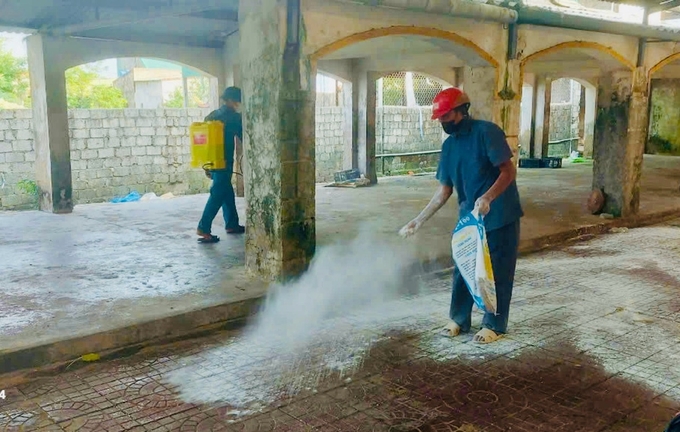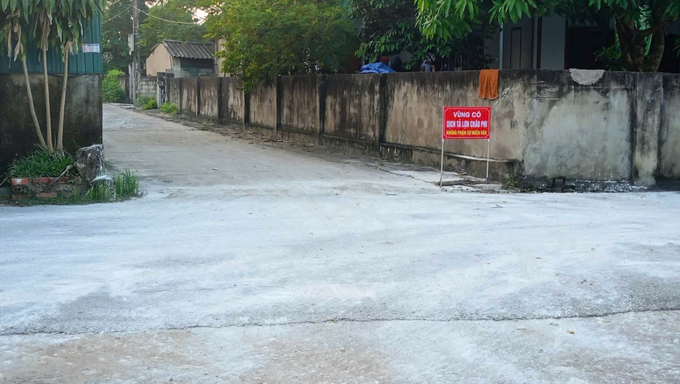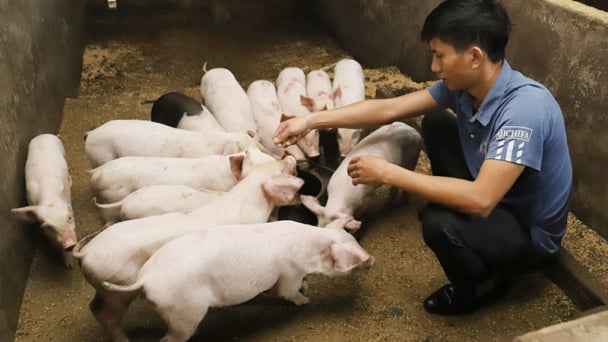June 19, 2025 | 22:21 GMT +7
June 19, 2025 | 22:21 GMT +7
Hotline: 0913.378.918
June 19, 2025 | 22:21 GMT +7
Hotline: 0913.378.918

The situation of African swine fever in Ha Tinh is basically under control. Photo: Thanh Nga.
A recent report from the Sub-Department of Livestock Production and Animal Health of Ha Tinh province states that there are records of African swine fever for less than 21 days in 6 communes of Cam Xuyen and Loc Ha districts. The disease only occurs in small-scale farms, causing 94 infected pigs to die and be eliminated. Local authorities, relevant agencies and households quickly isolated the affected area to prevent the disease from spreading widely.
“One problem is that this period of time coincides with the rainy season, hence high humidity. Livestock farmers are restocking large herds to meet the food demand of the upcoming Tet holiday, so it is necessary to raise awareness of biosecurity in livestock farming to avoid disease widespread,” said Nguyen Hoai Nam, Head of the Animal Health Management Office (Ha Tinh Sub-Department of Livestock Production and Animal Health).
At the time of the outbreak at Ho The Do's household (Ich Hau commune, Loc Ha district), the family had to eliminate ten pigs due to signs of sickness. Loc Ha district’s Center for Application of Science - Technology and Protection of Plants and Livestock coordinated with the district Office of Agriculture and Rural Development and the People's Committee of Ich Hau commune to quickly take samples for testing and set up seven warning posts for areas with African swine fever. At the same time, 198 liters of chemicals and 2,500 kg of lime powder were provided for disinfection in the localities.
Particularly in the case of African swine fever vaccines, although specialized agencies regularly promote and recommend them, no locality has taken the initiative to register for distribution. Farmers only vaccinate against foot-and-mouth disease, pasteurellosis, classical swine fever, etc.
Loc Ha district also propagates to livestock households to sign a commitment and strictly implement the "5 no’s" (no hiding the epidemic; no selling sick livestock; no transporting sick livestock and livestock products; no slaughtering sick, dead, or unidentified livestock; no dumping dead livestock into the surrounding environment, dead livestock must be destroyed according to regulations).
Households with sick livestock must confine and isolate them, thoroughly quarantine the farm area, and mark and strictly manage sick livestock to prevent disease widespread.

Now there are only 2 districts where the epidemic has not passed the 21-day period. Photo: Thanh Nga.
According to Hoang Thi Ngoc Diep, Deputy Director of Ha Tinh Sub-Department of Livestock Production and Animal Health, livestock households and local authorities should put in extra effort to protect the total pig herd of more than 413,000 in the province in the context of the complicated developments of African swine fever nationwide, the season changes and the situation of livestock showing lower resistance.
“From now until the end of the year, activities of buying, selling, transporting, and slaughtering animals and animal products in the area will increase. Livestock farmers need to strictly comply with regulations on disease declaration, and nutritional supplements. They can utilize tarpaulins to cover the barns, thereby increasing the resistance of livestock, and regularly clean barns to ensure a safe farming environment,” said Deputy Director Hoang Thi Ngoc Diep.
As for localities with disease outbreaks, farmers should actively and synchronously deploy prevention and control measures, instruct forces to eliminate sick and dead pigs as per procedure, strictly handle cases of not reporting disease outbreaks, selling, slaughtering, or dumping sick pigs into the environment which lead to the spread of the disease.
Relevant units must continuously review the total herd to provide additional vaccinations for livestock and poultry that have not been vaccinated, those that have expired their immunity period, and those that have just emerged; ensure that at least 80% of livestock are fully vaccinated with the correct vaccine at the time of vaccination.
Eradic weather has significantly affected livestock resistance. The implementation of biosecurity measures in livestock farming is limited. There is currently no effective vaccine to prevent African swine fever (ASF) for sows. These are favorable conditions for the disease to break out and spread widely, thus significantly affecting the livestock industry and consumer price index. Securing the food supply for the Lunar New Year 2025 becomes more urgent than ever.
Translated by Samuel Pham

(VAN) Biodiversity is being threatened by traditional remedies made from wildlife. Traditional medicine and humans must change to live in harmony with nature.

(VAN) Agrifood investment and finance solutions for people and the planet.

(VAN) Microplastic contamination has become pervasive in seafood, posing unprecedented challenges for food safety and marine ecosystems.

(VAN) Proactively using vaccines, combined with transport control and enhanced surveillance, is the only viable path toward biosecure and sustainable livestock production in Vietnam.

(VAN) Located in the southeast of Ho Chi Minh City, the Can Gio Mangrove Biosphere Reserve is considered the ‘green lung,’ a solid shield protecting the city.

(VAN) To address plastic pollution, closing the plastic recycling cycle will bring significant economic and environmental benefits.

(VAN) According to the Binh Thuan Department of Industry and Trade, in the first five months of 2025, Binh Thuan's dragon fruit export turnover increased by 20.65% compared to the same period last year.